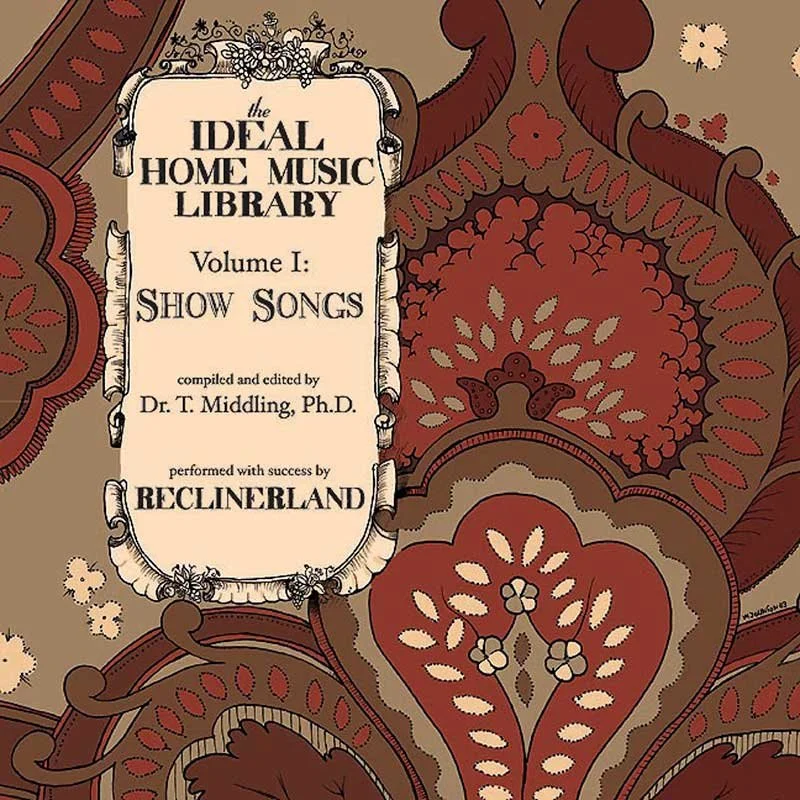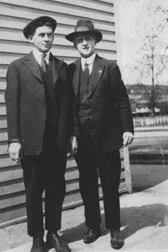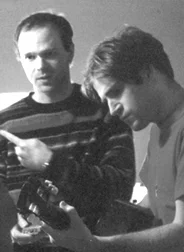The Ideal Home Music Library, Vol. 1 (2003)
Track Listing
1. Give Up Your Film Career (Lenny's Theme)
2. Long Island City Love Song
3. The Girl Of My Dreams
4. Come On Summer
5. Crash Site
6. One Of Those Nights
7. Miracle Of Miracles
8. My New York
9. Oh, James
10. Stayin' In (And Playin' A Tune)
11. The Lady From Reims
12. Rue Lane
Download the lead sheets
Audio
The Story Behind the Album
Professor T. Middling and examine the Ideal Home Music Library collection.
Ever since I've been able to write music, I have wanted to write a musical play. My first experiment with writing traditional-style show songs was in 1999, when I wrote So It Goes for HUSH Records's FLAG compilation. I wasn't inspired by Broadway, however, I was inspired by Paul Simon'sOvers, and tried to write something similar. I was beginning to understand and appreciate the importance of structure and wordplay in song, but I couldn't quite get it. Later, while living in New York, I heard The Magnetic Fields' 69 Love Songs album. Hearing a contemporary indie-pop songwriter indulging in word play and tight song structure like the kind you find in the best musical show songs changed my entire approach to songwriting. It really inspired me. At the same time, I was also being exposed to a lot of jazz music, which prior to then, I was inclined to avoid.(I was making the same mistake that many indie rockers make.) Yet, I began to cultivate a desire to write tight, lyrical, solid songs.
Adam Selzer produced at Type Foundry
Finally, in late 1999, while on a trip to Carbondale, IL to spend Thanksgiving with my girlfriend's parents, I sat at the piano with my girlfriend and together we wrote the song My New York. It was so much fun to write that song, and so much easier than I thought, that I had the idea to create an album of "oldies". The project was originally going to be titled 101 Golden Favorties. I began writing the songs in earnest in the year 2000, and by the time I left New York, I'd written Stayin' In (And Playin' A Tune), One Of Those Nights, and Long Island City Love Song. But my songwriting was still not where I wanted it to be, so by spring 2001, I resolved to return to Portland to finish studying music, so that I could learn to write and arrange like a real songwriter.
When I returned to Portland, I enrolled at Portland State to study jazz piano, barely passing the audition to get in by playing Stayin' In (And Playin' A Tune). It seems funny to say that I went back to school to learn to write an album, but that's sort of what I did. A few months into my second try at life in Portland, however, my idea for the project had changed. Upon my return, I discovered that many Portland bands were already writing retro-sounding music. Bands like Pink Martini, Squirrel Nut Zippers, the Cherry Poppin'...well, you know the bands I mean. Portland musicians were dressing in old suits, worshipping the gramophone, and an antique aesthetic was fast becoming a trend. In order that I stay off the bandwagon, and in order for Reclinerland not to become a retro novelty act, I thought it might be fun to pretend that the songs from the collection were authentic, obscure, lost songs from eras past. I decided to attribute each song to a fictional composer and make up some musical shows from which the songs were culled, since musicals were the vehicle for hit songs in the old days. I pretended was merely bringing the songs out into the world. This made the album kind of a one-off art project, instead of a change in direction for Reclinerland.
Two of the "original composers" of the songs.
The idea didn't crystalize until one day, while browsing at Powell's, I came across a multi-volume series of old songbooks entitled The Ideal Home Music Library. That's when I came up with the story behind the album: while I was temping at the American Institute of Musicology in New York, the janitor approached me with a huge book of obscure music he'd found hidden in the rare book room. Because we were both outsiders, he being a Ph.D. in Musicology who couldn't find a job in the research feild, and me being a struggling musician working on a temp assignment, we bonded and he asked me to help him record the songs. I suppose I might also have been influenced by the Flashman novels. Anyway, to take the backstory to absurd conclusions, I collected pictures of the composers and wrote colorful stories about each of them to include in the CD's booklet. I also thought it would be fun to have my friends come in and sing on each of the songs. After all, if they weren't my songs, why should I be the only one to sing them? Plus, I thought this might give me a chance to write for other musicians' registers, and help me to write songs from different perspectives. All of this was pre-musical writing training, you see.
We recorded the album at Type Foundry in Portland, OR, with Adam Seltzer engineering. It came out on HUSH Records and Lelp Recordings in 2003. I'll always admire (and feel a bit guilty about) Fred Schaff's and Chad Crouch's bravery for putting money behind this album, as it cost a fortune. The booklet that came with the album was 32 pages long and contained photograph of the "composers" (which I collected from various Portland antique shops), little stories, and page of sheet music. In the end, the whole project was very expensive.
The album got tons of wonderful press. In fact, I almost got sued when an old man in my Art History class, whom I'd asked to pose as Dr. Middling for a photo shoot that was to appear in the Oregonian, objected to my attributing a fictional name to his image. In fact, when he saw the finished booklet for the album, with all the photographs of real people given different names, he was so angry that he demanded I stop distributing the album or he would call a lawyer, track down the people in the photographs, and have their families sue me as well.
This album, in spite of a few typos, out-of-tune voices, and historical inaccuracies, was an artistic success. It's the first in a series of albums I will make of old-timey songs. The second volume came out in 2010, and I will begin work on the next volume next year. The idea is that each album will contain different arrangements of the old songs in the "book". The first volume contained jazz versions, the second volume contained plain, unadorned versions, and the next volume will contain arrangements for string quartet and voice. Perhaps a fourth volume will contain orchestral arrangements. Either way, the story of my relationship with Dr. Middling will continue with each installment, as the old dusty book provides us years of songs to bring forth into the world.
In the meantime, by the way, I have finally written a musical, for which I am now finishing the piano score. Next year I'll start work on another.
Nate Halloran and I.
credits
Nathaniel Halloran - bass
Derek Trost - drums, vibrophone
Michael Johnson - piano, guitars, voice, canned strings
Cory Gray - trumpet
Jenny Conlee - accordion, piano on Oh, James
Chad Crouch - voice on Come On Summer
Morgan Grace - voice on Long Island City Love Song and One Of Those Nights
Colin Meloy - voice on The Lady From Reims
Adam Selzer - engineering, voice on Miracle Of Miracles, drums on
Give Up Your Film Career (Lenny's Theme)
Recording took place at Type Foundry in Portland, OR between October, 2002 and April, 2003.
Mastered at Hush HQ by Michael Johnson and Chad Crouch.
All songs: words and music by Michael Johnson
© 2003 Zubsongs, ltd.




